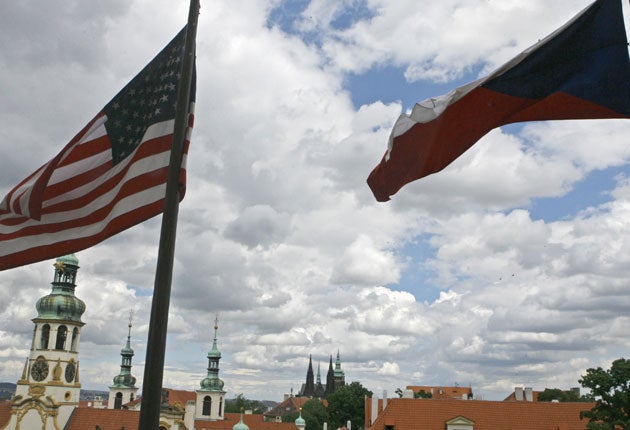Obama scraps Bush's European missile shield

Your support helps us to tell the story
From reproductive rights to climate change to Big Tech, The Independent is on the ground when the story is developing. Whether it's investigating the financials of Elon Musk's pro-Trump PAC or producing our latest documentary, 'The A Word', which shines a light on the American women fighting for reproductive rights, we know how important it is to parse out the facts from the messaging.
At such a critical moment in US history, we need reporters on the ground. Your donation allows us to keep sending journalists to speak to both sides of the story.
The Independent is trusted by Americans across the entire political spectrum. And unlike many other quality news outlets, we choose not to lock Americans out of our reporting and analysis with paywalls. We believe quality journalism should be available to everyone, paid for by those who can afford it.
Your support makes all the difference.President Barack Obama today shelved a Bush-era plan for an Eastern European missile defence plan that has been a major irritant in US relations with Russia. He said a redesigned defensive system would be cheaper, quicker and more effective against the threat from Iranian missiles.
"Our new missile defense architecture in Europe will provide stronger, smarter and swifter defenses of American forces and America's allies," Obama said in an announcement from the White House. "It is more comprehensive than the previous program; it deploys capabilities that are proven and cost effective, and it sustains and builds upon our commitment to protect the U.S. homeland."
The missile defense system, planned under the Bush administration, was to have been built in the Czech Republic and Poland. Obama phoned Czech Prime Minister Jan Fischer on Wednesday night and Polish Prime Minister Donald Tusk on Thursday to alert them of his decision.
Obama said the plan was scrapped in part because, after a review, the U.S. has concluded that Iran is less focused on developing the kind of long-range missiles for which the system was originally developed, making the building of an expensive new shield unnecessary. New technology also has arisen that military advisers decided could be deployed sooner and more effectively, he said.
Anticipating certain criticism from the right that he was weakening U.S. security, Obama said repeatedly that this decision would provide more — not less — protection.
"I'm committed to deploying strong missile defense systems that are adaptable to the threats of the 21st century," the president said.
He said the US would continue to work cooperatively with what he called "our close friends and allies" — the Czech Republic and Poland, which had agreed to host the Bush-planned shield at considerable cost in public opinion and their relations with Russia.
He also made a pointed reference to Russia and its long and heated objections to the shield. "Its concerns about our previous missile defense programs were entirely unfounded," Obama said.
Still, the decision could — and mostly likely will — be read as at least in part as an effort to placate Russia at a time when its support against Iran's suspected nuclear program has not been forthcoming and is sorely needed.
Join our commenting forum
Join thought-provoking conversations, follow other Independent readers and see their replies
Comments